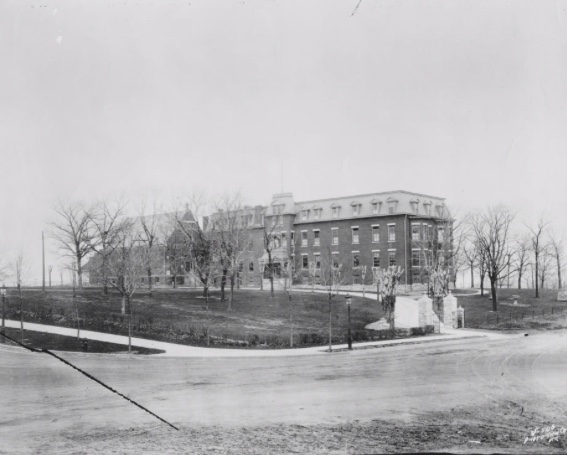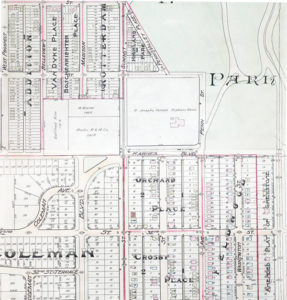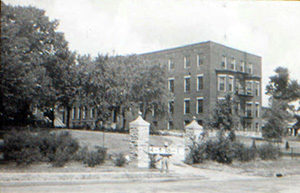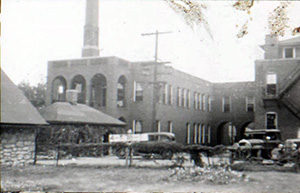
A home for orphans that took in hundreds of children between 1880 and 1960 was a well-known part of the Midtown landscape. The St. Joseph Orphan Girls’ home took up the entire block between SouthweTrafficway (then called Summit) and Pennsylvania north of 31st Street (Karnes).
Although it was called the Orphan Girls’ Home, the institution did more than house children without parents. It also provided for young people when their parents were temporarily or permanently unable to care for them.
For example, Helen Shrzelewakis came to Kansas City with her Polish immigrant parents as an infant and spent several years at the home around 1950. After the family arrived in Kansas City, her father’s health deteriorated, a result of the strain of living in a refugee camp. He was forced to enter an institution and could no longer provide for Helen. Her mother was lucky enough to be offered training as a nurses’ aide at St. Joseph Hospital, but her work schedule made it impossible for her to care for Helen.
She turned to the nuns at St. Joseph’s, and Sister Winifred immediately took Helen in. The sister had said the home was open to any child whose physical or moral life was in danger.

A 1907 Tuttle & Pike map shows the orphanage.
As part of our Uncovering History Project, the Midtown KC Post is examining each block in Midtown. A set of 1940 tax assessment photos is available for many blocks.
Today, the block between Southwest Trafficway (then called Summit) and Pennsylvania north of 31st Street (Karnes).
The community supported the home through the United Funds Agency and the Catholic Diocese. Many of the girls there were orphans awaiting a home, but there were others like Helen, whose families needed temporary help. Mothers could visit on Sundays and often took the girls to visit other family members. Younger girls attended classes at St. Joseph’s, while older ones attended Redemptorist High School.
The orphanage traced its roots back to Rev. Bernard Donnelly, a pioneer Kansas City priest who cared for orphans of the Civil War in his own home. The need was significant enough to warrant opening the home for girls in 1880. (Another orphanage, the Orphan Boys Home, operated on the current site of the Westport Shopping Center). St. Joseph’s housed 28 girls the year it opened. A chapel was added in 1895; additions on the north and east were also built in the early 1900s. The high school was started in 1940.
Community Rallies to Support the Home After 1921 Fire

The home in a 1940 tax photo.

Additional buildings on the grounds of St. Joseph Orphan Girls’ Home in 1940.
In 1921, 140 children, aged 5 to 14, lived at the home when a fire broke out at 10 a.m. Joseph Fitzgerald of 3103 Pennsylvania was across the street when the fire began. He rushed into the classrooms to warn the sisters, who ordered the girls to line up and marched them out to the lawn.
“The sisters led the children from the burning building to a corner of the big yard. The children clung to the hands of their rescuers, sobbing and crying, as they glanced back at their home and classroom, a seething furnace of flame and smoke. Speaking in comforting tones, the nuns began to tell stories” helping the girls feel more at ease, according to a newspaper story that day.
Hundreds of people lined the streets to watch the roaring fire and the firefighters struggling to carry hoses to the building. As the nuns stood praying, the firefighters removed sacred objects from the chapel and rear of the building. Of course, nothing so minor as their home burning up could stop the nuns from the day’s lesson plans. They soon led the girls to a nearby yard, where they continued their studies.
It was later determined that tinners working on the roof had ignited the fire.
Even as the fire smoldered, the local community donated to rebuild the orphanage.
Societal Changes Lead to Closing
By 1958, only 58 girls lived in the home. Two years later, the Catholic Diocese decided to move the girls elsewhere. The bishop said it was no longer needed because of changes in childcare methods, the expanding foster home program, and the work to close the Catholic Charities office and social workers.
In 1960, the diocese sold the property to Business Men’s Assurance Company of America, which razed the orphanage and built the BMA Tower (now called One Park Place).
Historic photos courtesy Kansas City Public Library/Missouri Valley Special Collections.
Do you know of a home for children that was located on 39th terr and Penn, OLGC church and school was on 39th terr and Washington this home for children was on the south corner it was facing North I think it was around 1800 they took babies, their is apts now
Are you the Helen in this article. You may not remember me as I think I was a bit older than you, but I recall a little red haired girl, some of my friends and I tried to befriend…I don’t think she spoke English and we tried to help her with our English language. My memory is vague, but I do remember this girl Helen. I am curious if you are this Helen that the article mentions?
In 1944 My Sister 1 1/2 year old and I barely over 4 were dropped off at what was the Church Rectory, 3934 Washington St. KC Mo., temporary converted to Child Care for babies & small children some time at the beginning of WW II. This home was constructed in 1904 and still stands today and is next to and East of the Catholic Church, “Our Lady Of Good Council” on the corner. I remember well the 24 hour freighting experience that seemed to last forever. Didn’t know why we were there, and had never seen a Nun before, didn’t know why they were dressed in Black and had no idea what there purpose was, other than trying to keep me in a crib, swatting me often, wanting to find my baby sister and the swatting I got for spilling orange juice in a miniature conical cup on the back far end of the wrap around porch while trying to boost myself upon the ledge.. Nuns were stern faced and always scolding somebody and the pungent order of Urine permeated the air Maternal Grand Dad whisked us to his home via Taxi.
Thanks for the history! My mom was an orphan there starting in the early 1930s. I have one picture that I could share and wonder if it was taken there.
Had no idea that was there. I use to work for the Postsl Service nearby. Very interesting. Thank you. Love Kansas City History. Keep up the good work.
BMA Towner? How about BMA Tower. Proofread before publish.
Always nice to get some feedback.
Wonderful article. What about the old Sparks Atlantic mega store that use to be near there off 31st and Main Streets?
I lived at St. Joseph Girls Home from 1946
Till about 1953 or so. Most of my memories there were good…but missed living with my family, of course! We always looked forward to The weekends when we had visits from family or trips home.I remember the girl Helen in this article…I believe she had red hair!
My grandma Mary Thery LeGrand was a adopted probably in 1940’s from a Kansas catholic orphanage. She was a teenager at that time. I believe it was ran by nuns so I am thinking this home that you are speaking of is possibly the one. Her birth certificate said Jane Parks. Is anyone familiar with her?
I believe I was assigned Helen Shrzelewakis as my after school charge. Can not believe after all these years I might be able to tell her how cute and adorable she was as a baby! I can still see her roses little cheeks. Would so love to meet her if possible.
I was born 1951 and because of my mother’s situation, I was placed in this orphanage for about 3-4 years, don’t know the exact time.
This is the first written account and picture I’ve seen describing the home. Unfortunately, I don’t have pictures of the grounds etc. I do have baby pictures of what I believe were taken inside the home. As there is no way to post pictures, I can’t show them.
Thank you for the article as it helps to fill a gap in my life about which I have only been able to talk.
My grandmother and her three sisters were raised at the St. Joseph orphanage for girls after her mother died in an accident when my grandmother was five years old. My grandmother and her siblings would have been living at the orphanage when the 1940 tax photo was taken. It’s very interesting to see these photos and hear the related history as it doesn’t seem like there is much information to be found about the orphanage. Thank you for the information!
Anyone remember a temporary Catholic Child Care Home for Children Under 5, in the Rectory
at 3934 Washington St. KC Mo.(Westport area) My sister and I had a short visit here in 1944, where the Nuns cared for us. This was likely for helping with working parents or in the service during WWII. There are no records in the Dioceses and am looking to see if others shared this
trauma?
Hello, Does anyone know where the records are for the St Joseph’s Home for girls around 1930?
Thank you.
My grandmother was there with her sister in the 1930 census. Is there anyway to find out what year she entered the orphanage.